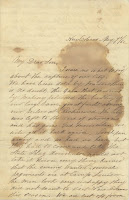 When the American Civil War began in April of 1861, a 23-year-old Boston man named George Francis Whitcomb joined the 5th Massachusetts Volunteer Militia. According to census data, he was employed at the time as either a clerk or a printer. Whitcomb was not alone in enlisting: he had three older brothers, two of which also signed up for military service.
When the American Civil War began in April of 1861, a 23-year-old Boston man named George Francis Whitcomb joined the 5th Massachusetts Volunteer Militia. According to census data, he was employed at the time as either a clerk or a printer. Whitcomb was not alone in enlisting: he had three older brothers, two of which also signed up for military service.Here at Rauner, we have a letter that Whitcomb wrote to one of his brothers on July 19, 1861. At the time, Whitcomb is in Centreville, Virginia, and has a "great enthusiasm" about what lies ahead. Perhaps his enthusiasm was because he had yet to see battle, having spent the last couple of months with drills and preparation in a Massachusetts training facility. On July 14th, his regiment had finally decamped as part of an "advance guard of one of the most important columns consisting of about 20,000 troops…headed by its fifty pioneers, with their muskets slung upon their backs and carrying axes upon their shoulders."
As the regiment heads south towards the city of Alexandria, Virginia, Whitcomb describes the countryside he crosses, which sometimes is "uninteresting." They encounter no significant resistance but come across several individual Confederate soldiers and capture a "leading rebel named Holly, who was mounted and armed." Whitcomb's company is able to extract some information from him regarding Confederate troop movement after which "his horse was confiscated for the use of one of our officers, and he was allowed to depart."
Whitcomb continues his letter, providing more detail about his company movements, its encounters, and the sounds of skirmishes in the distance. The Union forces arrive at Manassas Junction on July 20th, a day before the the first major battle of the Civil War. Whitcomb presages this encounter by saying that "the rebels are constantly receiving reinforcement and a great battle may be expected in a few days."
However, despite the impending conflict, Whitcomb is not scared. He closes his letter by telling his brother: "It may be the last time I shall ever write to you. God grant me that it is not so but if it is so ordained do not mourn for me remember I die for my country’s sake for which I will freely give my last drop of blood."
As luck would have it, Whitcomb did not die at the First Battle of Bull Run on July 21, 1861; in fact, only nine soldiers of the 5th Mass Regiment were killed during the fighting that day. After the battle concluded, Whitcomb continued serving in the Union Army for more than three more years, eventually becoming a captain in the 30th Massachusetts Infantry. However, despite his initial good fortune, he was killed in action on October 19, 1864. He was only 27 years old.
 Sometime after 1862 and before his death in 1864, Whitcomb took a blood-stained letter from the body of a dead Confederate soldier "for preservation", or so it says on the envelope. The letter is dated May 4th, 1862, and was written in New Orleans by a woman named Cecilia who then mailed it to her son in the field. Although we likely will never know the full identities of either correspondent, the content of the letter provides an unvarnished Southerner's perspective on the war. Writing shortly after the capture of New Orleans, Cecelia describes the devastation of her city and leaves no doubt about her anger towards the "traitors" who sold them out and the "leaders at Richmond":
Sometime after 1862 and before his death in 1864, Whitcomb took a blood-stained letter from the body of a dead Confederate soldier "for preservation", or so it says on the envelope. The letter is dated May 4th, 1862, and was written in New Orleans by a woman named Cecilia who then mailed it to her son in the field. Although we likely will never know the full identities of either correspondent, the content of the letter provides an unvarnished Southerner's perspective on the war. Writing shortly after the capture of New Orleans, Cecelia describes the devastation of her city and leaves no doubt about her anger towards the "traitors" who sold them out and the "leaders at Richmond": "We are cut off from everything….The city looks deserted many have left their homes and nothing in the markets…All the cotton burned…All our Navy gone, burned or blown up by ourselves…. We must put ourselves in the hand of God and he will deliver us in time and we will be victorious. She closes her letter with “Good Bye God Bless you and keep you from harm.”
To look at both letters, come to Rauner and ask to see Mss 861419.
No comments:
Post a Comment